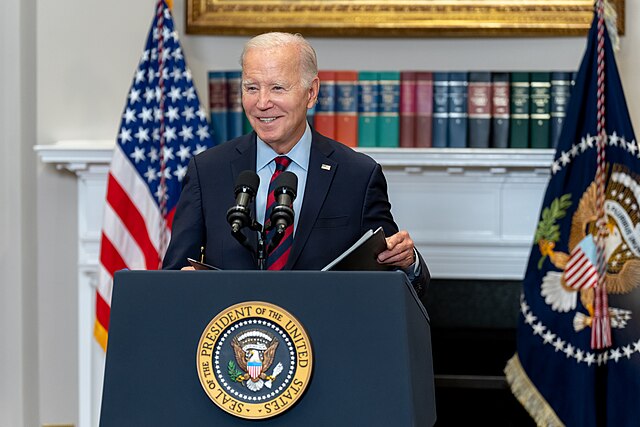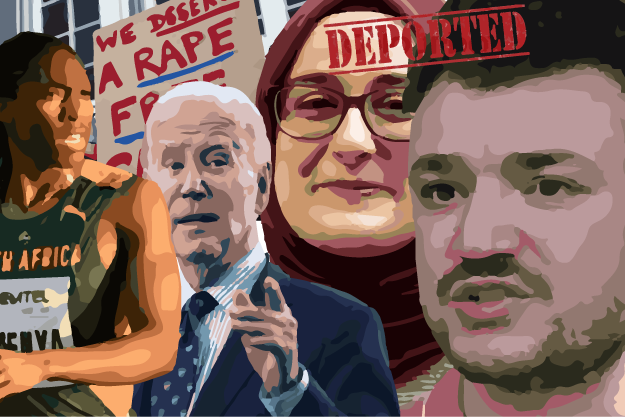liberal brainwashing centers
ICE Deports Student Visa Holders for “Antisemitism”
Mahmoud Khalil
Mahmoud Khalil, a recent graduate, activist, and legal permanent resident, was arrested earlier this month in what supporters say was retaliation for his advocacy for Palestinian rights at Columbia University. He was then transferred by the Department of Homeland Security to a detention center in Louisiana, far from his home and family. His legal team, including the Center for Constitutional Rights, NYCLU, ACLU, and others, argues that his detention is unconstitutional—violating his rights to free speech and due process—and have obtained a court order blocking his deportation.
Khalil’s arrest marks the first publicly known deportation attempt tied to former President Trump’s promised crackdown on student protesters opposing the war in Gaza. The administration argues that by allegedly supporting Hamas, protesters gave up their right to stay in the U.S. An official, McLaughlin, specifically linked Khalil’s arrest to his protest involvement, accusing him of leading activities aligned with Hamas, a designated terrorist organization.
Rumeysa Ozturk
Rumeysa Ozturk, a Turkish PhD student at Tufts University, was arrested near her home in Somerville, Massachusetts, as she was heading to an Iftar dinner. According to her attorney, she was physically restrained by plainclothes immigration officers who only showed badges after detaining her. Ozturk was later transferred to an ICE facility in Louisiana, despite no charges being filed against her. Her visa was terminated, and a federal judge has since blocked her deportation while determining the legality of her detention.
Ozturk’s arrest is part of the Trump administration’s broader immigration crackdown targeting students allegedly involved in pro-Palestinian protests and accused of supporting Hamas, a designated terrorist organization. DHS claims she engaged in such activities, though no specific evidence has been provided. Her case closely parallels that of Mahmoud Khalil, a Palestinian activist also detained under similar allegations. Both arrests involved secretive tactics, cross-state transfers, and are drawing legal and civil rights challenges over constitutional concerns.
In March 2024, Rumeysa Ozturk co-wrote a student newspaper op-ed criticizing Tufts University's response to calls for divestment from companies linked to Israel over the Gaza conflict. The piece cited serious allegations against Israel, including possible genocide. Her brother, Asim, believes she is being targeted for expressing these views.
student visa purges
DOGE Cuts Biomedical Research Funding
Trump and Student Loans
Removing the SAVE plan & IDR plans
Removing Loan Forgiveness Options
Narrowing Eligibility for PSLF (Public Student Loan Forgiveness)
biden's student loan forgiveness
A U.S. judge temporarily blocked President Joe Biden's student loan forgiveness plan, siding with six Republican state attorneys general who challenged the policy. The ruling by Judge Matthew Schelp prevents the administration from canceling student debt until the lawsuit is resolved. The plan, which aims to forgive up to $73 billion in student loans for approximately 27.6 million borrowers, was initially proposed by the Department of Education after two previous attempts were blocked by courts.
The states argue that the Department of Education overstepped its authority by attempting to implement such a policy through regulation rather than legislation. The Biden administration, which had campaigned on providing debt relief, expressed disappointment with the ruling, asserting it would continue to fight for the policy in court. The plan targets individuals who owe more than they initially borrowed, those who have been repaying loans for 20-25 years, and others eligible for prior forgiveness programs. Critics, including Republicans, argue the policy is an overreach and unfair to non-college-educated Americans.

affirmative action ruling (2023)
Colorblind Admissions
The U.S. Supreme Court's recent decision has effectively ended race-conscious admission programs at colleges and universities, invalidating affirmative action policies at Harvard and the University of North Carolina. In a 6-3 decision, the conservative majority, led by Chief Justice John Roberts, ruled that colleges must adopt colorblind criteria for admissions. This marks a significant reversal of previous rulings that allowed race to be considered as one factor in admissions decisions to promote diversity
While the court acknowledged the importance of considering how race impacts individuals' lives, it emphasized that using race as a factor in admissions is unconstitutional. Justice Clarence Thomas, in a concurring opinion, argued that affirmative action stigmatizes minorities. Conversely, justices Sonia Sotomayor and Ketanji Brown Jackson dissented, arguing that the decision entrenches racial inequality in education.

Impact of the Ruling
The ruling has sparked concern that minority representation, particularly among African American students, will decrease in college admissions, a trend observed in places where affirmative action was previously banned. The court did leave room for race to be considered in specific contexts, such as military academies, and noted that colleges can still assess how race has shaped an applicant's life experiences.
This decision is expected to have far-reaching impacts beyond higher education, potentially affecting race-based policies in employment and other sectors. Public opinion on affirmative action is divided, with some polls showing support for race-neutral policies, while others favor diversity initiatives. The ruling has set the stage for ongoing debates about how to achieve racial equity in education and beyond.
Title IX Rule Change - Less LGBTQ+ Protections & Sexual Assault Protections
The U.S. Department of Education has issued new guidance requiring schools and universities to return to policies set during President Donald Trump's first term regarding sexual misconduct complaints. The guidance mandates live hearings and more protections for students accused of misconduct, following rules established by former Education Secretary Betsy DeVos. This shift comes after a federal judge in Kentucky overturned the Biden administration's Title IX rules, which aimed to expand protections for LGBTQ+ students and redefine sexual harassment.
Under the Trump-era rules, schools are required to hold live hearings, allowing accused students to cross-examine their accusers, which was removed by the Biden administration. The DeVos policy also narrowed the definition of sexual harassment and reduced the liability of schools, holding them accountable only for "deliberate indifference."
The decision follows legal challenges from several states against the Biden administration’s rules, with critics arguing that they infringed on free speech and forced schools to accommodate transgender students in ways that conflicted with their sex at birth. Advocates of the Trump-era policies argue that they offer fairer treatment for accused students, while victims' rights groups say they could retraumatize survivors and deter reporting. The guidance also directs schools to reorient ongoing investigations to comply with the 2020 rules.

